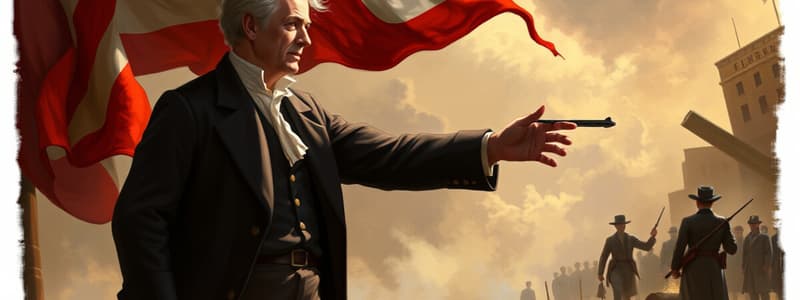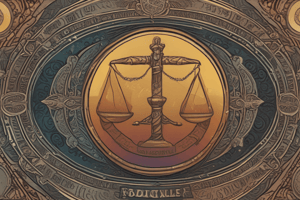Podcast
Questions and Answers
What was the purpose of the Amnesty Act of 1872?
What was the purpose of the Amnesty Act of 1872?
- To remove voting restrictions for all citizens
- To establish a new political party
- To impose new restrictions on voting
- To remove voting restrictions for most secessionists (correct)
What was Andrew Johnson impeached for?
What was Andrew Johnson impeached for?
Violation of the Tenure of Office Act
What were Black Codes?
What were Black Codes?
Laws limiting rights of African Americans
Who were the Buffalo Soldiers?
Who were the Buffalo Soldiers?
What did Carpetbaggers seek in the South after the Civil War?
What did Carpetbaggers seek in the South after the Civil War?
What are civil rights?
What are civil rights?
What did the Compromise of 1877 accomplish?
What did the Compromise of 1877 accomplish?
What was the purpose of the Freedmen's Bureau?
What was the purpose of the Freedmen's Bureau?
What was the Grandfather Clause?
What was the Grandfather Clause?
What did Jim Crow Laws enforce?
What did Jim Crow Laws enforce?
Who assassinated Abraham Lincoln?
Who assassinated Abraham Lincoln?
What was the Klu Klux Klan?
What was the Klu Klux Klan?
Match the following amendments with their purpose:
Match the following amendments with their purpose:
What was the Military Reconstruction Act?
What was the Military Reconstruction Act?
What was the outcome of Plessy vs. Ferguson?
What was the outcome of Plessy vs. Ferguson?
What are poll taxes?
What are poll taxes?
Who were the Radical Republicans?
Who were the Radical Republicans?
What does Reconstruction refer to?
What does Reconstruction refer to?
What is sectionalism?
What is sectionalism?
What is segregation?
What is segregation?
What is sharecropping?
What is sharecropping?
Flashcards are hidden until you start studying
Study Notes
Amnesty Act of 1872
- Signed by President Ulysses S. Grant, it removed voting restrictions and disqualifications for most secessionists.
- Excluded approximately 500 Confederate military leaders.
Andrew Johnson and Impeachment
- Initiated a reconstruction plan, cancelled Civil War debts, and repealed secession acts.
- Impeached for violating the Tenure of Office Act by dismissing a federal official without Senate approval.
Black Codes
- Enacted in former Confederate states to restrict the rights and freedoms of African Americans.
Buffalo Soldiers
- African American soldiers who played a crucial role in displacing Native Americans during the Western Indian Wars.
Carpetbaggers
- Northerners who moved to the South after the Civil War in search of economic opportunities.
Civil Rights
- Constitutional rights ensuring equality and equal legal protection for all citizens.
Compromise of 1877
- Marked the end of the Reconstruction era and resulted in Rutherford B. Hayes becoming president.
Freedmen's Bureau
- Established to assist former slaves in education, job training, and various services during Reconstruction.
Grandfather Clause
- Laws that allowed white voters to bypass restrictions like literacy tests and poll taxes, effectively disenfranchising African Americans.
Jim Crow Laws
- Legislation that enforced racial segregation between blacks and whites.
John Wilkes Booth
- Infamous for assassinating President Abraham Lincoln.
Ku Klux Klan
- A secret organization established to eliminate African American political participation.
Military Reconstruction Act
- Divided the South into five military districts; aimed to establish loyal state governments.
- Included the Command of the Army Act and the Tenure of Office Act to limit presidential power.
Plessy vs. Ferguson
- Supreme Court case where the argument that segregation laws violated the Fourteenth Amendment's equal protection clause was rejected.
Poll Taxes
- Taxes charged as a prerequisite for voting, aimed at preventing African Americans from voting.
Radical Republicans
- Politicians advocating for severe penalties for Confederates and supporting laws that granted citizenship and voting rights to African Americans.
Reconstruction
- The post-Civil War period focused on rebuilding Southern states and reintegrating them into the Union, while abolishing slavery.
Sectionalism
- Loyalty or support for a specific region over the country as a whole.
Segregation
- The forced separation of racial groups in social and public settings.
Sharecropping
- An agricultural system where laborers worked on leased land in exchange for a share of the harvest.
13th, 14th, and 15th Amendments
- 13th Amendment: Abolished slavery.
- 14th Amendment: Defined African Americans as citizens.
- 15th Amendment: Granted African American men the right to vote.
Studying That Suits You
Use AI to generate personalized quizzes and flashcards to suit your learning preferences.




